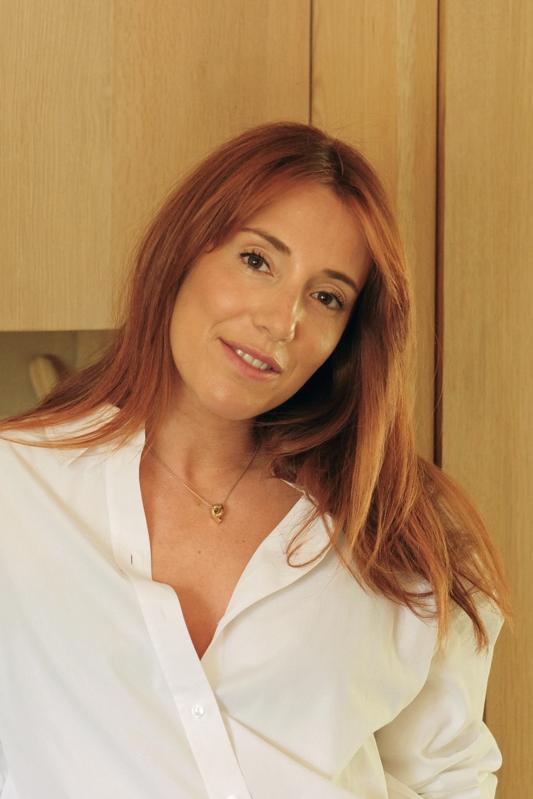In the world of sustainable dining and innovative entrepreneurship, Camilla Marcus stands out. Recognized as one of Fast Company’s Most Creative People in Business, Marcus is not just a chef and restaurateur; she’s also an activist for how we perceive our food systems and interact with our environment.
Marcus founded New York City’s first certified zero-waste restaurant west~bourne in 2018. Nestled in SoHo, the restaurant earned acclaim not only for its vegetable-forward dishes but also for its commitment to keeping 91% of its waste out of landfills or incinerators. When the pandemic shuttered west~bourne’s doors in 2020, Marcus took the opportunity to expand west~bourne’s impact beyond its physical space, transforming it into a provisions brand focused on regeneration.
In the interview with Marcus below, we explore this transition as well as topics such as the importance of sourcing ingredients from regenerative farms for both environmental and quality reasons, her decision to produce avocado oil over other types of oils, as well as her new cookbook that will be out this fall titled “My Regenerative Kitchen,” aimed at making regenerative agriculture actionable for consumers.
Christopher Marquis: Can you tell us a bit about west~bourne’s evolution from being NYC’s first zero-waste restaurant to becoming an online packaged goods brand? What was your vision for the transformation?
Camilla Marcus, founder of west~bourne
Bliss Katherine
Camilla Marcus: Starting as a restaurant really made sense and aligned perfectly with our belief in the power of community and our commitment to making a meaningful impact. Restaurants are anchors of change for food– they are the great translators between farms and us as citizens in our home. We make more decisions about what we eat and drink in our daily lives than anything else, and I’ve always felt that chefs and restaurants are a centerpiece of inspiring those changes that ripple out into our homes. Dining out is most often where we discover new ingredients, consider the importance of sourcing, or even hear about new farming practices.
The goal was to develop the packaged products out of the restaurant, and while we didn’t anticipate having to close our space during the pandemic, we realigned our focus on growing our regenerative mission beyond the four walls to find an impactful home in every home.
Marquis: What inspired you to source ingredients exclusively from regenerative farms? What is your process for sourcing partners? Which ingredients does west~bourne regeneratively source?
Marcus: Our core mission is to align personal and planetary health through food. Science shows that regenerative agriculture is the only system that can pull down carbon from our atmosphere in time to fight the looming climate crisis. We believe this is where all climate efforts should be centered. That’s why we source ingredients exclusively from small growers who use regenerative methods to ultimately drive demand back into this emerging system that will be the way forward for how our food is grown.
Starting with the early days of the restaurants and through my whole career in this industry, I’ve taken great pride in building relationships with the conscious stewards of our land. We have over a decade of relationships with farm partners all around the world that are leading the way to regeneration for the next generation. We simply want to be mindful partners to help support their journey and incredible biodiversity through foods that we all consume day in and day out. Not to mention, ingredients sourced from regenerative farms yield far higher nutrient-rich and more naturally delicious food than traditional or even organic growers.
Marquis: Why did you choose to produce avocado oil versus another type of oil? What makes west~bourne’s avocado oil different from other brands?
Marcus: Working as a professional chef, I’ve had experience with so many different oils, but as someone who prioritizes health and sustainability, traditional options like butter, canola and vegetable oils no longer meet the mark. Avocado oil emerged as a game-changer in my journey towards a biodiverse, climate-conscious, and healthy pantry.
Beyond its impressive environmental benefits, avocado oil’s neutral flavor profile distinguishes it from other oils, allowing it to seamlessly complement both sweet and savory dishes. In baking, it’s become my go-to substitute for butter, offering exceptional performance without compromising taste.
From its high smoke point to its nutrient-rich composition, avocado oil stands out as a top-tier culinary ingredient. Its ability to enhance nutrient absorption aligns perfectly with our mission to promote holistic well-being.
We were shocked to learn through a UC Davis study that 89% of avocado oils on the shelf right now are blended or rancid. What makes west~bourne’s oils so different from other brands is that they’re 100% pure, as nature intended.
The cultivation of avocados fosters biodiversity and supports regenerative farming practices, benefiting not only farmers but also the environment. By diversifying our pantry staples, we can contribute to a healthier ecosystem and a more sustainable future.
Marquis: What’s next for west~bourne? Are there other product launches in the works?
Marcus: One of our company values is embracing that this journey is a constant work in process as we work on our mission to impact, not imprint. That’s why this summer, we’re reformulating and relaunching our best-selling snack mixes to incorporate new regeneratively sourced ingredients with more durable backyard compostable packaging, and an even higher nutritional profile. Additionally, we’re expanding our reach into major grocery partnerships, a pivotal step as we focus on growing our presence in the retail market.
Our recent collaborations with Oishi and Casa Bosques have been met with tremendous enthusiasm from our community, underscoring our dedication to innovation and exploration. Whether it’s experimenting with zero-waste practices, forging partnerships with regenerative farms, or championing biodiverse brands, we’re always eager to push boundaries and engage with our audience. We have a full slate of limited edition products popping up throughout the year.
Lastly, we’ll be reintroducing some beloved classics intermittently throughout the year, offering delightful seasonal surprises. Our pancake and waffle mix will be making a special comeback just in time for the holiday season.
Marquis: You’re preparing to launch a cookbook this Fall, “My Regenerative Kitchen” which is the first that will make regenerative agriculture applicable and actionable to the consumer. What inspired you to write this, and what can we learn from reading?
Marcus: There is an overwhelming amount of data that shows that regenerative agriculture is the only thing that can solve the climate crisis, but translating that knowledge from academia to everyday households presents a challenge. I thought, how I could make a meaningful contribution, one that not only resonated with people but also surprised and delighted home cooks? After all, food isn’t just sustenance; it’s a form of activism that requires everyone’s involvement to effect real change.
Will the entire food system undergo a miraculous transformation overnight? Not until every household embraces the cause. Just as we’ve seen with organic products and the reduction of plastic water bottle usage, widespread awareness and participation are key catalysts for systemic change.
Our connection to the soil is profound; it’s the very essence of our existence, grounding us to the earth. By returning to the soil, we embark on a journey towards sustainable health, recognizing that our well-being is intricately linked to the health of our planet.
The climate crisis may seem distant and daunting, but its effects ripple through our daily lives. As we prioritize self-care with mental health breaks, we must also nourish ourselves with wholesome, unprocessed foods, aligning our personal well-being with the health of our environment.
In the realm of soil and soul, ordinary cooking becomes a powerful act of transformation, activating a larger role in the fight against climate change. This book, through its blend of stories, photography, research, recipes, techniques, and pro tips, serves as an inspiring companion for your journey towards radical change. By embracing a lifestyle that honors our Earth, we simultaneously nurture our own health, fostering a symbiotic relationship between soil and soul. Every small shift we make collectively builds towards a significant impact, driving us towards a future of continuous evolution and pursuit of progress.
Marquis: What does a regenerative kitchen seek to do? How can we create one ourselves?
Marcus: Regenerative kitchens seek to reverse the damage caused by big farming and food production. When we talk about the environmental impact of our food, it’s not just about what’s on our plate; it’s about the entire journey from seed to shelf. Sourcing accounts for a staggering 70% of emissions, which is why regenerative practices as well as upcycling and minimizing food waste are so crucial. For me, it’s also about embracing a mostly plant-based diet and eliminating plastics and harmful chemicals from my home. Our kitchen should reflect these values, from how we select and prepare our food to how we handle waste. It’s all part of the journey towards a more sustainable future.
As individuals who cook and eat, we hold incredible power to make a difference, especially within the confines of our own homes. When it comes to sustainability, two key actions stand out: sourcing regeneratively and composting. These simple yet impactful practices can significantly reduce our environmental footprint.
In the U.S. alone, 40% of food ends up wasted. When food rots in landfills, it’s taking food away from those that need it and creates a methane time bomb, more devastating than CO2. Choosing to save that carrot top, plan your meals, or embrace composting is more than good sense—it’s a radical act against a wasteful system and an effort to safeguard the earth, and our future along with it.
Marquis: In your opinion, what is the solution to the climate crisis? What is the impact that the food industry has? How can consumers help make a difference in their daily lives?
Marcus: The long-term solution to climate change lives with the land, not in a lab, so get to know your local farmers and support an industry that respects the land’s natural processes. Considering that 50% of America consists of farmland, it’s imperative that we shift our mindset from simply exploiting it to actively reconnecting with it. Our future lies in harmony with nature, as we recognize that our well-being is intricately intertwined with the health of the land.
Regenerative agriculture is the only solution to the climate crisis, and it’s one of the few areas of impact that we as consumers can contribute to and be part of solving in our everyday lives, just through the intent we put behind our decisions about what to eat and drink each day. Collectively, we can and must shift the food industry. My mission is to make people realize it isn’t as much of a task as it actually is.

